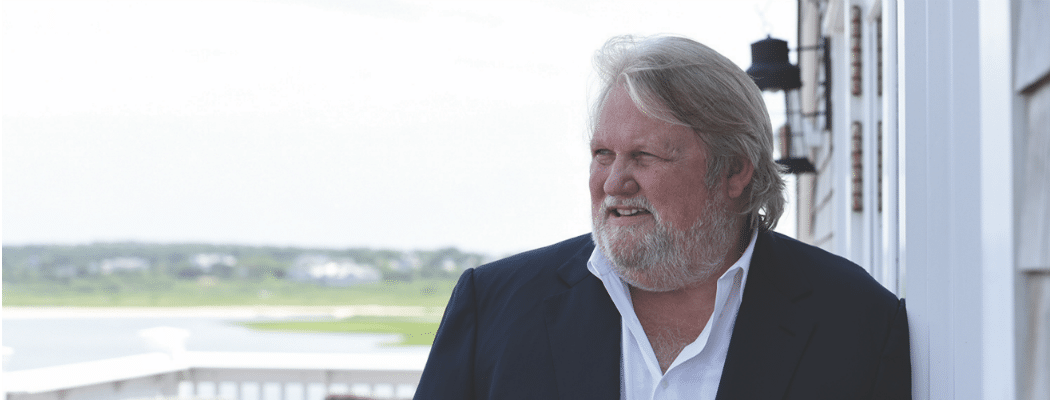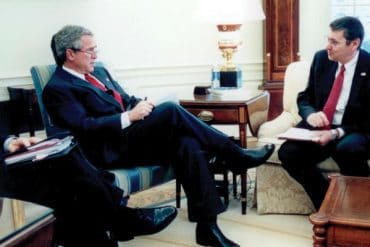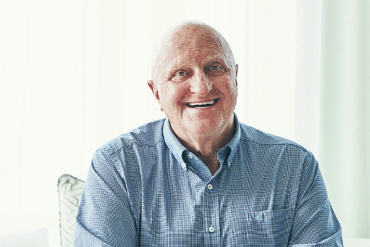Economist David Smick shares his view on the future of the economy.
Nantucket summer resident David Smick predicted the global financial crisis of 2008. His New York Times bestseller The World Is Curved: Hidden Dangers to the Global Economy was lauded by critics as “eerily prescient” when it came to forecasting the financial collapse that unfolded mere months after the book was published. Yet no amount of foresight could have helped Smick predict the economic tumult in which the country is currently embroiled as a result of the coronavirus pandemic. Indeed, Smick says that this financial crisis and the response are historically unprecedented. Yet as a respected global macroeconomic strategist, investor and chairman of a leading macroeconomic advisory firm in Washington, D.C., Smick has an important perspective on the crisis. Moreover, as he’s currently producing a full length documentary on partisan hate, national division and their threats to America’s future, Smick has a compelling insight on how the country should respond.
 N MAGAZINE: Washington, D.C. has produced three fiscal rescue packages, the latest costing a whopping $2.2 trillion. Can you put that in context?
N MAGAZINE: Washington, D.C. has produced three fiscal rescue packages, the latest costing a whopping $2.2 trillion. Can you put that in context?
SMICK: We are in a war against COVID-19. Fighting World War II, we spent about $4 trillion in today’s dollars. This latest package was a bazooka. But this is not an economic and financial meltdown in the classic sense. This was a deliberate effort to put the economy into a medically induced coma. The plan is that at the appropriate moment, once the horrific health situation begins to subside, they’ll bring the economy out of the coma. But we’ve never done this before. Success will depend on whether average folk—consumers, investors and small business employers—retain the same level of confidence and optimism that they had about America’s future before the crisis. Will they have short memories and forget the pain and suffering and joblessness … and death? That’s the essential question. I’m on the cautiously optimistic side.
N MAGAZINE: What’s a critical part of our economic recovery?
SMICK: Some doomsayers, after the stock market’s March meltdown, were whispering the word “depression.” But this lacked credibility for one reason: The Federal Reserve. The Fed responded in such a major way that the package is, in effect, much larger than $2.2 trillion. More like $4 trillion to $6 trillion. In a crisis, people expect the Fed to come to the rescue as a lender of last resort. This time it also came as the buyer of last resort. The latest fiscal package allows the Fed to inject unlimited amounts of liquidity to keep the credit system from freezing up. The Fed is not only buying bonds, including corporate bonds, it is actually going in and lending to businesses through the banking system. The Fed and Treasury are saying that if you are a small business and you retain your employees during these trying times, we’ll forgive the loan. That’s never been done before.
It’s a different ball game compared to the 1930s. During the Depression, the central bank mistakenly allowed liquidity in the banking system to dry up. People and businesses couldn’t get loans. The situation today is just the opposite. Think of it as the Fed having a million fire hoses shooting water at a burning house. In the 1930s, they practiced water conservation.
My gut tells me that if we hit the turning point in the health crisis relatively soon, the stock market and the economy will come back relatively quickly even if the actual employment and other data continue to look horrible throughout the summer. If the medical models are wrong and the turning point comes in months not weeks, this will be one hell of an ugly summer. But the bottom line: Never before in history have we marshaled this much fiscal and monetary firepower. I’m betting that Fed Chairman Jay Powell is the hero when the historians write about this crisis.
N MAGAZINE: While you are not a doctor, are you optimistic on the health front?
SMICK: You can’t look at things the way you would a still photograph. Things are highly fluid. New York Times columnist Tom Friedman had it right when he said you have exponential health developments on both sides. You have the disease increasing exponentially, but you also have our knowledge of the disease—coming medical breakthroughs, new drugs, new combinations of old drugs, vaccines—also increasing exponentially. If the latter quickly catches up with the former, we could suddenly be seeing a much more positive picture. Too much of the 24/7 cable news coverage presents a simplistic static snapshot of the horror show. Remember, in 1980, during the AIDS crisis, a major news magazine argued in a cover story that by the year 2000, one third of the country would be HIV-positive with unimaginable death counts. Never happened. Habits changed and new drugs appeared. That’s why medical forecasts are tricky. The announcement of the problem with grand overstatement becomes the cure.
N MAGAZINE: Obviously, the virus was not deliberate on China’s behalf, but it did expose flaws like their secrecy, their health care and their sanitation codes. Does this pandemic hurt China’s stock in the long term?
SMICK: Yes, it definitely hurts China globally. Given the dimensions and severity of their problem, the Chinese leadership’s lack of transparency was a global disgrace. For at least a month if not longer, healthcare professionals worldwide were operating based on the belief in China’s misleading data. Many nations avoid criticizing China because the ruthless leadership has a history of being vindictive. One reason for that leadership’s frequent outbursts and threats against the United States is that the Chinese economy is a lot weaker than they are admitting. The economic data is deliberately misleading too.
 N MAGAZINE: Do you think this crisis will cause American companies that have done manufacturing in China to bring those operations home?
N MAGAZINE: Do you think this crisis will cause American companies that have done manufacturing in China to bring those operations home?
SMICK: I’m already hearing from German industrialists who have major dealings with China, who privately are asking, “Does it really make sense to have our most vital supply chains on the other side of the world?” In every boardroom around the world, corporate executives are rethinking their approach to various unstable and ruthless parts of the world. They are also worried about not being prepared for the next crisis. After all, we are living in a world that’s become a paradox wrapped in a riddle—a world where things we thought could never happen are happening.
N MAGAZINE: Do you see a quick V-shaped or protracted U-shaped U.S. recovery?
SMICK: It is all dependent on when we hit the coronavirus apex—the downside of the curve—and whether coming medical breakthroughs are dramatic enough such that we can handle a return of the virus in the fall or early next year. Even before COVID-19, the global economy was changing. For the major economies, industrialization and trade were in decline with the advent of artificial intelligence and the cloud. Economic powers like Germany, China, Japan and South Korea were increasingly at a disadvantage with manufacturing and exports still a relatively large part of their GDP. They are now being forced to restructure their economies. America’s highly nimble, flexible and innovative service and tech-oriented economy was already poised to thrive in this new environment—and it still is.
The nightmare scenario for us is that, as a result of the crisis, we become like Japan. Thirty years ago, Japan was hit with a nasty financial crisis. The economy, overloaded with debt, went into a long-term, disinflationary, low-growth funk. The question now is this: Will we be different and come out of this economic crisis with our confidence intact? Will we still want to dream big and dare big?
N MAGAZINE: Why is the stock market in the current crisis so erratic?
SMICK: The equity markets will continue to be erratic until the full picture of the country’s medical condition becomes clear. The medical professional uses models for their predictions. In economics, econometric models for the macroeconomic outlook have been largely discredited. In general, our financial markets are now compelled by computer-driven investors. Algorithms, not people, are driving the stock market—sometimes driving it into the ground.
N MAGAZINE: When the dust settles, what do you see as the long-term economic changes in this country?
SMICK: There will be hundreds of changes to our daily lives. An obvious example: The workplace will be redefined. We’ll do a lot more electronic meetings using sophisticated screens. We’ll either become closer or more distant from each other as a society. At this point, I’m not sure which way we’ll go. Clearly we’ll lose a lot of our privacy as governments increase their efforts at surveillance. What I hope is that our leaders in Washington stop their partisan circus of hate and begin to work together. The stakes now are too high to continue the status quo. Look at how quickly the coronavirus turned our lives upside down. If you look at the list of other threats to America, they’re terrifying. What if we faced a threat even worse than the coronavirus? Would we be prepared? Or will our leaders be mired once again in their culture of contempt—our civil war of hate? Our leaders need to wake up.
COVID-19 changes everything. We need to rethink some aspects of global capitalism. Does America want essential global supply chains to be so vulnerable to parts of the world that lack our value structure? Can we as a people psychologically withstand global financial meltdowns that seem to come like a giant wrecking ball every decade or so? There’s got to be a better way.
The American economy is clearly out of balance. Over the last thirty to forty years, finance and banking have become more important than actually thinking up revolutionary ideas—more important than inventing and making things. Consider this: Seventy-five years ago, financial firms made a buck for every $40 the economy produced in GDP. Today, they make a buck for every $12 the economy produces in GDP. But is this windfall sustainable? We now have a “velvet rope” financial aristocracy of brains and money that has cut itself off from the rest of society. But this is risky for our democracy.
I worry that we are transitioning to some dangerous geopolitical times. Democracy is on the run. And if ever there was a time for national unity, the time is now. But my gut tells me that real change will have to come from the bottom up not top down. It will come when voters choose leaders willing to put country before party. The coronavirus crisis may have pushed us in that direction a bit—we came together temporarily—but we’re not there permanently. I am fully aware that the American hate industry, where people are making money and gaining power and fame exploiting our divisions, is formidable.
David Smick was interviewed during the last week of March.








